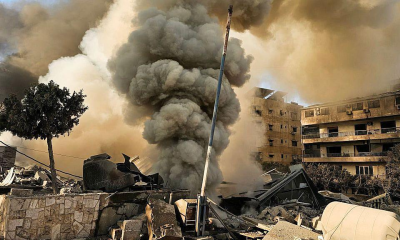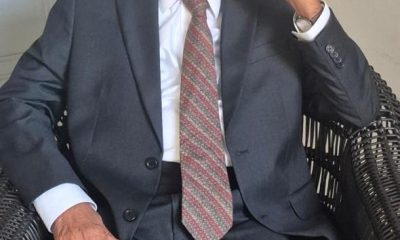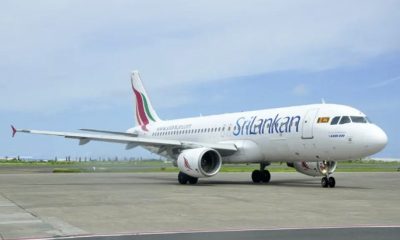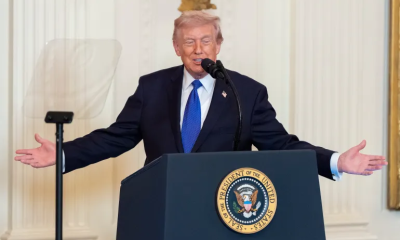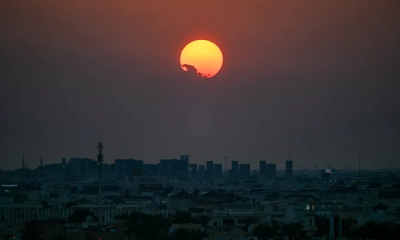News
Post-war reconciliation: Lanka ready to accept support of int’l partners
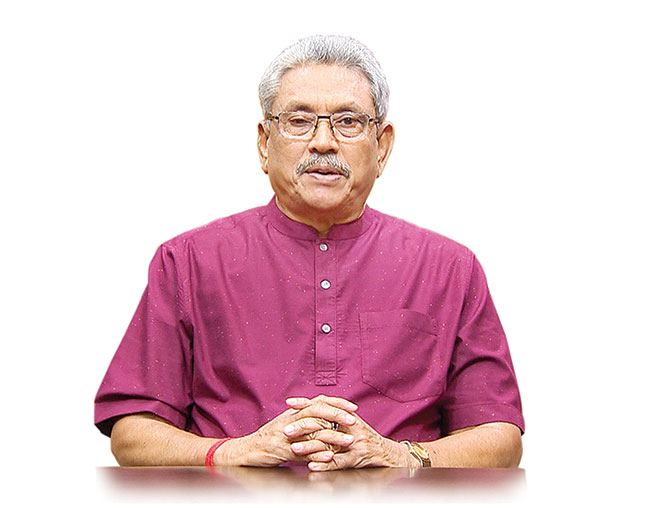
UN-Prez tells UNGA
President Gotabaya Rajapaksa yesterday (22) declared his readiness to engage all domestic stakeholders, and to obtain the support of international partners and the United Nations, in the post-war reconciliation process.
Addressing the 76th UNGA, President Rajapaksa said that it was his government’s firm intention to build a prosperous, stable and secure future for all Sri Lankans, regardless of ethnicity, religion, or gender. “However, history has shown that lasting results can only be achieved through home-grown institutions reflecting the aspirations of the people.
The following is the full text of President’s speech: “The COVID-19 pandemic has had a devastating impact on humanity. I sympathise deeply with all who have lost their loved ones during the pandemic. I thank frontline healthcare and essential workers around the world for their dedication and commend the World Health Organisation for its crisis response.
I also greatly appreciate the rapid advances made by the scientific and medical communities in devising vaccines and treatment protocols to combat the virus.
At the same time, we must recognise that the challenges surrounding production, distribution, deployment and acceptance of vaccines must be overcome urgently if the spread of dangerous new virus strains is to be prevented.
Ensuring that everyone, everywhere, is vaccinated is the best way out of the pandemic.
Although still a developing nation, Sri Lanka has been very successful in its vaccination programme.
We have already fully vaccinated nearly all those above the age of 30.
Everyone over the age of 20 will be fully vaccinated by the end of October.
We will start vaccinating children over 15 years of age in the near future.
The rapid progress of vaccinations was enabled by coordinated efforts between healthcare workers, Armed Forces and Police personnel, Government servants, and elected officials.
In collaboration with the WHO, Sri Lanka is establishing a Regional Knowledge Hub to facilitate exchange of lessons learnt from COVID-19 and support countries to recover better.
Sri Lanka also benefitted greatly from financial and material support provided by bilateral and multilateral donors to manage the pandemic.
I thank these nations and institutions for their generosity.
The increased global cooperation visible during this ongoing crisis is greatly encouraging.
However, there is still more to be done.
Mr. President,
The economic impact of the pandemic has been especially severe on developing countries.
This has placed the implementation of the 2030 Agenda for Sustainable Development Goals at considerable risk.
It is vital that more initiatives including development financing and debt relief be adopted through international mechanisms to support developing nations and help them emerge from this uncertain situation.
Sri Lanka too has suffered greatly due to the pandemic.
In addition to the tragic loss of life, our economy has been deeply affected.
The lockdowns, together with general movement restrictions, reduced international travel, and slower global growth have affected nearly all sectors of our economy.
Tourism, one of Sri Lanka’s highest foreign exchange earners and a sector that supports nearly 14% of the population, has been devastated.
This industry, together with small and medium businesses in many other sectors, received Government support through interest moratoriums and other financial sector interventions.
Daily wage earners and low-income groups were also supported through grants of cash and dry rations during lockdowns, adding significantly to state expenditure.
In addition to their immediate impact, these economic repercussions of the pandemic have limited the fiscal space available to implement our development programmes.
Mr. President,
As devastating as the consequences of the pandemic have been to humanity, the world faces the even greater challenge of climate change in the decades to come.
As emphasised in the recent report by the Intergovernmental Panel on Climate Change, the unprecedented effect of human activity on the health of the planet is deeply worrying.
Addressing the grave threats posed by climate change and the loss of biodiversity requires decisive and urgent multilateral action.
As a climate-vulnerable country, Sri Lanka is deeply aware of the dangers of climate change.
Sri Lanka’s philosophical heritage, deeply rooted in Lord Buddha’s teachings, also emphasises the vitality of preserving environmental integrity.
It is in these contexts that Sri Lanka is a Commonwealth Blue Charter Champion and leads the Action Group on Mangrove Restoration.
Through the adoption of the Colombo Declaration on Sustainable Nitrogen Management, which seeks to halve nitrogen waste by 2030, Sri Lanka has also contributed to global efforts to reduce environmental pollution.
Having participated virtually in the Pre-Summit held in April, I trust that the United Nations Food Summit later this month will result in actionable outcomes to promote healthier, more sustainable, and equitable food systems globally.
Such outcomes will be crucial to human health as well as to the health of our planet.
Sustainability is a cornerstone of Sri Lanka’s national policy framework.
Because of its impact on soil fertility, biodiversity, waterways and health, my Government completely banned the use of chemical fertilisers, pesticides, and weedicides earlier this year.
Production and adoption of organic fertiliser, as well as investments into organic agriculture, are being incentivised.
I appreciate the encouragement received from many global institutions and nations for our efforts to create a more sustainable agriculture in Sri Lanka.
The conservation of our environment is one of our key national priorities.
We aim to increase forest cover significantly in the coming decades.
We are also working to clean and restore over 100 rivers countrywide, and to combat river and maritime pollution.
We have also banned single use plastics to support ecological conservation.
Sri Lanka recognises the urgent need to reduce use of fossil fuels and support decarbonisation.
Our energy policy seeks to increase the contribution of renewable sources such as solar, wind and hydropower to 70% of our national energy needs by 2030.
Mr. President,
Sri Lanka welcomes the support of the international community as it engages in the task of reviving its economy and carrying out its national development programme.
We intend to make full use of geostrategic location and our robust institutions, strong social infrastructure, and skilled workforce, to attract investment and broaden trade relationships.
My Government is focusing on extensive legal, regulatory, administrative and educational reforms to facilitate this, and to deliver prosperity to all our people.
Sri Lanka has enjoyed universal adult franchise since pre-Independence.
The democratic tradition is an integral part of our way of life.
My election in 2019 and the Parliamentary election in 2020 saw Sri Lankan voters grant an emphatic mandate to my Government to build a prosperous and stable country, and uphold national security and sovereignty.
In 2019, Sri Lanka experienced the devastation wrought by extremist religious terrorists in the Easter Sunday attacks.
Before that, until 2009, it had suffered from a separatist terrorist war for 30 years.
Terrorism is a global challenge that requires international cooperation, especially on matters such as intelligence sharing, if it is to be overcome.
Violence robbed Sri Lanka of thousands of lives and decades of prosperity in the past half century.
My Government is committed to ensuring that such violence never takes place in Sri Lanka again.
We are therefore acting to address the core issues behind it.
Fostering greater accountability, restorative justice, and meaningful reconciliation through domestic institutions is essential to achieve lasting peace.
So too is ensuring more equitable participation in the fruits of economic development.
It is my Government’s firm intention to build a prosperous, stable and secure future for all Sri Lankans, regardless of ethnicity, religion, or gender.
We are ready to engage with all domestic stakeholders, and to obtain the support of our international partners and the United Nations, in this process.
However, history has shown that lasting results can only be achieved through home-grown institutions reflecting the aspirations of the people.
Sri Lanka’s Parliament, Judiciary and its range of independent statutory bodies should have unrestricted scope to exercise their functions and responsibilities.
Mr. President, Excellencies, Distinguished Delegates.
If, in keeping with the theme of our General Debate today, we are to truly build resilience through hope, we must all strive towards the common good.
It is the role of the United Nations to facilitate this by treating all sovereign states, irrespective of size or strength, equitably, and with due respect for their institutions and their heritage.
I request the United Nations and the international community to ensure the protection of the Buddhist heritage of Afghanistan.
I call on the member states of this august Assembly to work together in a spirit of true cooperation, generosity, goodwill, and mutual respect to foster a better and more sustainable future for all humanity.”
News
Attorney At Law S K Sangakkara pasess away

It is with deep sorrow that we announce the passing of Mr. S. K. Sangakkara, Attorney-at-Law. He was the loving husband of Kumarie, beloved father to Thusharie, Vemindra, Saranga, and Kumar, loved father-in-law to Sanjay, Nipuni, Ru, and Yehali, adored grand father to Thehan, Methvan, Nethya, Vinaya, Kaya, Seth, Kavith and Swyree.
His remains will lie at his residence in Kandy for relatives and friends to pay their last respects. We also ask that the privacy of the family be respected.
The funeral will take place on the 4th of March 2026 at 6.00 p.m. at the Mahaiyawa Cemetery, Kandy. The cortège will leave the residence at 4.30 p.m.
He will be dearly missed by his loving family, friends, colleagues, and all who knew him.
News
Socialist Alliance expresses concern over GoSL’s growing military ties with US

The Socialist Alliance, comprising the Lanka Sama Samaja Party, the Communist Party of Sri Lanka, the Democratic Left Front and the Sri Lanka Mahajana Party, in a statement issued yesterday (02) strongly and unequivocally condemned the US and Israel for killing the Supreme Leader of Iran, Ayatollah Ali Khamenei, and the latest acts of military aggression carried out by those two countries against Teheran.
“These attacks represent a grave violation of international law, an assault on the sovereignty of a United Nations member state, and a threat for uncontrollable conflict, which may escalate into a third World War,” the Socialist Alliance said.
Text of the statement: ‘The Socialist Alliance is alarmed with the growing military contacts between Sri Lanka and United States in evolving geo-political developments in the context of middle – east war and beyond.
“The Socialist Alliance condemns strongly the National People’s Power (NPP) government’s deepening military cooperation with the United States. The recent transfers of US naval and aviation assets and operational integration into US-led commands represent a dangerous abandonment of the country’s longstanding non-aligned foreign policy. It may lead to Sri Lanka being involved in US President Trump’s illegal aggression against Iran.
“According to the Ministry of Defence the United States has now provided a total of four former US Coast Guard cutters and 10 TH-57 Sea Ranger (Bell 206) helicopters to the Sri Lanka Navy (SLN) and Sri Lanka Air Force (SLAF). These acquisitions have transformed Sri Lanka into one of the largest operators of former US Coast Guard vessels in the Indo-Pacific. While the government frames the transfers as enhancing humanitarian assistance and disaster relief capabilities, the vessels’ operational history and specifications are evidence of a darker purposes.
“The two high endurance cutters of the Hamilton class are offshore patrol vessels (OPVs) most suited for deep-sea surveillance and high-seas operations. They are not merely for coastal defense, the type being commonly deployed with US Navy carrier battle groups. They are designed for power projection and are being used to integrate Sri Lanka into U.S. Central Command (CENTCOM) operations in the Middle East.
The operational deployment of these assets has already begun. The Sri Lanka Navy has committed an OPV to the US-led “Operation Prosperity Guardian” in the Red Sea and Gulf of Aden, operating under Combined Task Force 153 (CTF 153). This task force falls under the Combined Maritime Forces (CMF), which is commanded by a US Navy Vice Admiral who simultaneously serves as Commander of U.S. Naval Forces Central Command (NAVCENT) and the US Fifth Fleet, headquartered in Manama, Bahrain.
“This means Sri Lankan naval officers and ships now operate directly under US-led command structures. It provides the US with a Navy that can operate within its command framework, freeing US assets for higher-end missions, effectively making our forces a subordinate component of the American war machine.
“In a significant escalation of this integration, Sri Lanka assumed command of Combined Task Force 154 (CTF 154) in January 2025. This multinational maritime training task force, operating under the US Fifth Fleet, is responsible for training personnel across the Middle East. This is not as a sign of national prestige, but a mechanism that gives the US-led coalition greater legitimacy and deepens Sri Lanka’s entanglement in American strategic objectives.
“This must also be seen in context of the recent signing of a Defence Memorandum of Understanding (MoU) under the State Partnership Programme (SPP) between the Sri Lankan Armed Forces and the Montana National Guard in November 2025, which is a pretext for embedding US military structures within Sri Lanka.
“This is not non-alignment. This is alignment. It is a complete subservience to the US Indo-Pacific strategy, making a mockery of the principles of sovereignty and peaceful coexistence that once defined our foreign policy.
“This alignment with the US poses an immediate danger, Sri Lanka risks being dragged into the illegal US–Israeli aggression against Iran, our long-standing friend.
“The Socialist Alliance calls for,
1. The immediate disassociation of the Government of Sri Lanka and the Armed Forces from the illegal US-Israeli aggression against Iran.
2. The immediate cessation of all joint military operations with US forces, including the withdrawal of Sri Lankan personnel from US-led commands in Bahrain and the Red Sea.
3. A full public disclosure of all agreements, including the India-Sri Lanka defence MoU and the recent US State Partnership Programme agreement, whose contents remain secret.
4. A parliamentary inquiry into whether these military pacts will lead to a full Status of Forces Agreement (SOFA), potentially granting US forces access to Sri Lankan ports, airports, and military infrastructure.
5. A return to a genuine non-aligned foreign policy that serves the interests of the Sri Lankan people, not the geopolitical ambitions of foreign powers.
“The NPP government was elected on a platform of change, yet it is presiding over the most significant erosion of our sovereignty in decades. We call upon all anti-imperialist, patriotic, and democratic forces to unite in opposition to this drift toward war and the surrender of our national independence.”
News
FSP proposes self-governing regions, bicameral legislature to address national issue

Frontline Socialist Party (FSP) Propaganda Secretary Duminda Nagamuwa has said that establishment of self- governing regions, bicameral legislature consisting of two Houses and recognition of upcountry Tamils as Sri Lankans would be necessary to solve the national issue. Nagamuwa declared that the FSP was ready to spearhead the fight to achieve those objectives.
Nagamuwa, a senior member of the breakaway faction of the JVP, said so at the fourth annual convention of the party held at the Sugathadasa Indoor stadium on Sunday (01). Nagamuwa stressed that a bicameral legislature was necessary to prevent the passage of laws targeting a particular community.
Alleging that the JVP had disregarded the FSP’s advice not to pursue UNP leader Ranil Wickremesinghe’s strategy, Nagamuwa emphasised that the national problem couldn’t be resolved under the present system.
Declaring that daunting challenges couldn’t be addressed by pursuing neo-liberal policies, the FSPer reiterated their commitment to, what he called, a people-centric economic agenda.
At the onset of his speech, Nagamuwa said that the FSP launched political activities, under extremely difficult circumstances, more than one and half decades ago. Referring to the abduction and the disappearance of Lalith Kumar Weeraraja and Kugan Muruganandan, in Jaffna, on Dec, 9, 2011, Nagamuwa said that they wouldn’t give up their struggle, regardless of the continuing threats.
Commenting on its role in the Aragalaya protest that forced President Gotabaya Rajapaksa out of office, in July 2022, Nagamuwa said that the FSP joined the people at a time some declared their inability to participate in a leaderless campaign. Nagamuwa was referring to the JVP’s initial reaction to the protest campaign. According to Nagamuwa, Ranil Wickremesinghe, having received the presidency through illegal means, sought to proscribe the FSP as he resented their role in Aragalaya.
Nagamuwa also found fault with the JVP for backing Maithripala Sirisena’s candidature at the 2015 presidential election. The ex-JVPer said that his former party simply joined the group that declared that Sirisena’s victory would pave the way for the abolition of the executive presidency. The FSP Propaganda Secretary accused Anura Kumara Dissanayake of following Wickremesinghe’s harmful IMF policy that may cause significant damage to the EPF and ETF funds.
The FSP also attacked the JVP-led NPP government over the ongoing moves to introduce a new anti-terrorism law, in place of the Prevention of Terrorism Act (PTA). That move was meant to suppress democratic rights of the people and right to dissent, Nagamuwa said, while questioning, what he called, the incumbent government’s undisclosed agreements with the US and India. Nagamuwa also pointed out that those who campaigned on an anti-corruption platform were now struggling to cope up with such accusations regarding the coal procurement deal.
Nagamuwa said that either the government should take tangible measures against corruption or the crooks will take hold of the current dispensation. Anti-corruption actions wouldn’t be on political platform at any future election, Nagamuwa predicted.
Nagamuwa said that the NPP had been fragmented and it was only a question of time the current dispensation faced public protests over its policies, particularly giving in to IMF demands and India. The SJB’s Sajith Premadasa and SLPP’s Namal Rajapaksa couldn’t fill the political vacuum caused by the disintegration of the NPP, Nagamuwa said that their move was to empower the people.
Nagamuwa said that those who propagated racism to grab power couldn’t succeed again. According to him such projects couldn’t achieve political objectives, Nagamuwa said while referring to several incidents, including the burning of the Jaffna library and violence in Darga town.
By Shamindra Ferdinando
-

 Opinion5 days ago
Opinion5 days agoJamming and re-setting the world: What is the role of Donald Trump?
-

 Features5 days ago
Features5 days agoAn innocent bystander or a passive onlooker?
-

 Features6 days ago
Features6 days agoRatmalana Airport: The Truth, The Whole Truth, And Nothing But The Truth
-

 Business7 days ago
Business7 days agoDialog partners with Xiaomi to introduce Redmi Note 15 5G Series in Sri Lanka
-

 Features7 days ago
Features7 days agoBuilding on Sand: The Indian market trap
-

 Opinion7 days ago
Opinion7 days agoFuture must be won
-

 Features2 days ago
Features2 days agoBrilliant Navy officer no more
-

 Opinion2 days ago
Opinion2 days agoSri Lanka – world’s worst facilities for cricket fans


